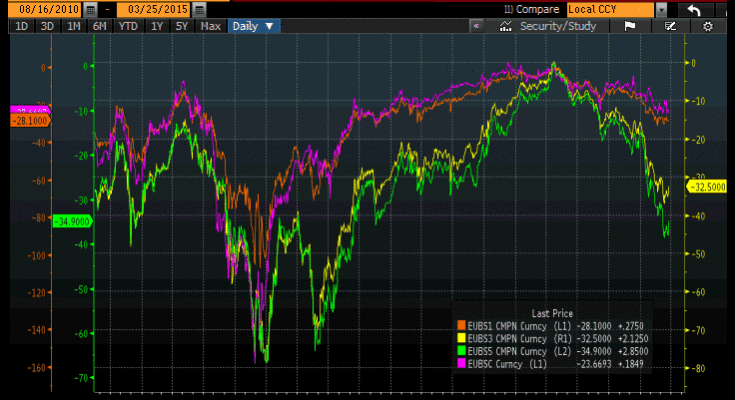An Accelerating Trend
While the euro itself has recovered a bit from its worst levels in recent sessions, euro basis swaps have fallen deeper into negative territory. In order to bring the current move into perspective, we show a long term chart below that includes the epic nosedive of 2011. We are not quite sure what the move means this time around, since there is no obvious crisis situation – not yet, anyway.
A negative FX basis usually indicates some sort of concern over the banking system’s creditworthiness and has historically been associated with euro area banks experiencing problems in obtaining dollar funding. This time, the move in basis swaps is happening “quietlyâ€, as there are no reports in the media indicating that anything might be amiss. Still, something is apparently amiss:

Party like it’s 2011: Three month, one year, three year and five year euro basis swaps – click to enlarge.
Worries About Greece?
It is possible that concerns over Greece find expression in this rather obscure market – apart from the Greek government bond market itself that is. The Greek yield curve remains steeply inverted, with 2 year notes yielding 20.14%, 5 year notes yielding 15.47% and 10 year bonds yielding 11.19%. Such steep yield curve inversions have been a typical feature of sovereign debt crisis conditions in the past. Greece’s bond yields are actually slightly below recent peaks, as the Tsipras/Merkel meeting has briefly rekindled hopes.
However, the Greek government is indeed running out of money – it has adopted all sorts of stop-gap measures to keep the ship afloat, as a result of which it is now running out of those as well. The ECB meanwhile has tightened the screws by making a drip-feed operation out of ELA and telling Greek commercial banks that they are no longer allowed to increase their holdings of Greek government bills.
EU officials are reportedly discussing the possibility of Greece being forced to impose capital controls (similar to what happened in Cyprus) if the government misses any upcoming debt repayments. The ECB’s recent decisions have been justified by a) the prohibition of direct central bank financing of governments and b) its need to limit its exposure because it appears as though Greece may not come to an agreement with its creditors after all.

